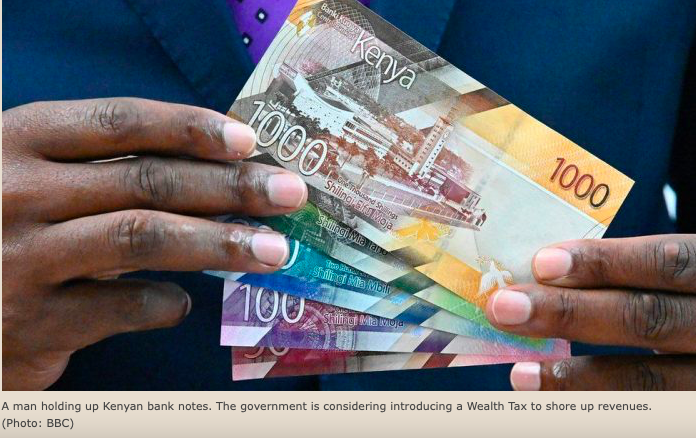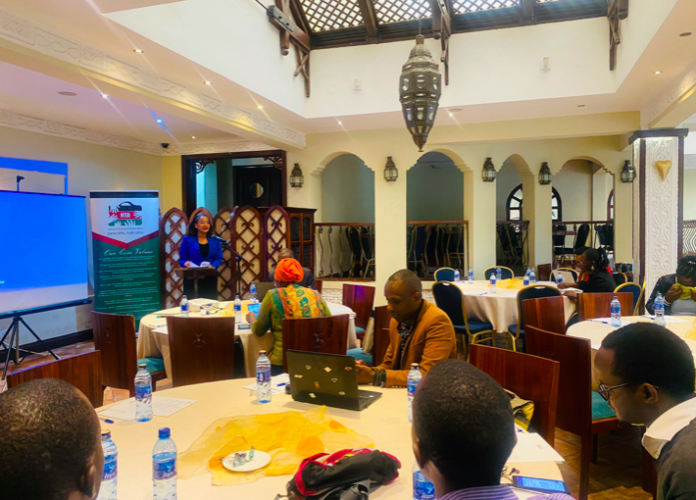By Winnie Kamau
Nairobi, Kenya: Kenya’s Tax compliance stands at 24% compared to Africa’s compliance which stands at 27%.
“This means for every 100 Kenyans in a room only 24 of them are tax compliant,” says Eric Kinaga a Program’s Manager at The Institute of Social accountability (TISA).
Eric was speaking during the launch of The Potential for Taxing Wealth in Kenya report.
The report recommends taxing the Wealthy Kenyans as a potential source of revenue in Kenya’s tax system.
“Taxing wealth is regarded as an effective tool for income redistribution within the economy, thus enhancing the progressivity of our tax system,” says Eric.
According to TISA, the tax lobby group says, if Wealth tax is imposed on the richer section of society the government would get an addition of Ksh. 176 Billion with the intention of promoting a redistribution of resources and bringing better parity amongst taxpayers.
The wealth tax can effectively reduce wealth concentration at the very top for the simple reason that, if the wealthy must pay a percentage of that wealth in taxes each year, it becomes harder for them to amass even more wealth.
This can be achieved by widening the tax base for wealth tax and introducing higher tax rates for high income earners.
 Today, Kenya only imposes a narrow range of wealth taxes including Capital Gains Tax at a rate of 5% on gains made from the transfer of property and property taxes. Efforts were made to increase the rate of CGT to 12.5% through the Finance Bill 2019.However, this was met with heavy lobbying efforts by the Kenyan corporate sector and the proposal was rejected.
Today, Kenya only imposes a narrow range of wealth taxes including Capital Gains Tax at a rate of 5% on gains made from the transfer of property and property taxes. Efforts were made to increase the rate of CGT to 12.5% through the Finance Bill 2019.However, this was met with heavy lobbying efforts by the Kenyan corporate sector and the proposal was rejected.
Kenya needs to re-evaluate its property taxation regime with a view to ensuring the tax burden is shared fairly. There is a need to review and introduce wealth taxes in Kenya including new ones such as CGT on indirect transfers of assets and inheritance tax.
The property taxation framework at county level must be reviewed and harmonized with a view to increasing efficiency. Property taxation revenue performance should also be included in annual revenue performance reports.
Taxation In Kenya
Taxes in Kenya are categorized into direct and indirect taxes, and customs duties. Currently, Kenya’s tax base is composed of; Income Tax which takes the form of Corporation Tax, Pay As You Earn (PAYE), Withholding Tax (WHT), Advance Tax, and Installment Tax, Rental Income Tax, Value Added Tax (VAT), Excise Duty, Turnover Tax, Capital Gains Tax (CGT) and Agency Revenue which comprises of Stamp Duty and Betting Tax.
According to Kenya Revenue Authority (KRA) Kenya’s tax policy is informed by the Constitution of Kenya 2010, specifically, Article 209, which empowers the National Government to impose various taxes including Income Tax, Value-Added Tax, Customs Duties, Excise Duty, imports and exports duties, and any other taxes provided for through an Act of Parliament or County Assembly.
Furthermore, Article 209 spells out taxes to be charged by the County Governments which include property rates, entertainment taxes, and any other tax authorized through an Act of Parliament.
 Tax Exemptions Beneficiaries
Tax Exemptions Beneficiaries
Kenya forgoes at least Ksh. 100billion ($1.1 billion) annually as a result of tax exemptions and incentives, an amount almost double the national government budgetary allocation to health sector for the fiscal year 2015/16.
According to the report the main beneficiaries of such exemptions are Multinational corporations, who are among the wealth holders in the country. Further, tax evasion by unscrupulous business owners resulted in revenue loss of approximately Ksh. 100 billion ($1.1 billion) translating to 8.3% of the total government revenue.
Another way through which the wealthy deny the government revenue is through stashing wealth in tax havens. Some powerful corporations and individuals accumulate more wealth through influencing and manipulating the country’s policies in their favor.
Way Forward
There’s need to to be a review on tax rates upwards currently applicable on wealth like Capital Gains Tax (CGT), Property taxes, Stamp duty, Withholding Tax, and Land rates.
Introduce the taxes on individuals’ net worth, define the High-Net-Worth Individual’s tax threshold, introduce progressive tax rates that vary with an individual’s income to enhance progressivity of the tax.
An urgent need to set up a department of Wealth Tax with a complete mandate to identify properties to be taxed, value them, and implement the applicable wealth tax.
There’s also a need to integrate the tax systems between the National Government, County Governments and Kenya Revenue Authority including land management systems/databases to the iTax system of KRA systems.
Integrate tax administration with UpToDate technology for improved efficiency, KRA pin to be linked with individuals with properties and transactions for ease of tracing taxable wealth.
Devise ways of evaluating digitally held wealth and adopt systems to track the offshore behaviors of citizens to net hidden wealth.
There’s a need to work on mechanisms for determining the correct value of tax base and aggressively fight corruption and tax evasion.














